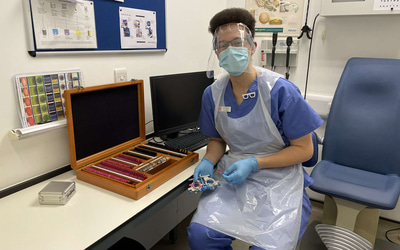- OT
- Life in practice
- Career development
- The impact on the university experience
COVID-Generation
The impact on the university experience
OT spoke to students, Saira Saleem and Nkosi Yearwood, about their experience of the past year and the challenges and changes ahead

28 April 2021
How has COVID-19 affected students and pre-registration optometrists in the past year?
Third year student at Cardiff University and pre-registration councillor for Optometry Wales, Nkosi Yearwood (NY): I think challenging is the word. As a third year student there is an interesting approach to the ‘COVID-19 sight test’ compared to the ‘pre-reg sight test’ in that the former is truncated to only perform what you need to, and the latter is usually about performing everything on everyone, to make sure that you know how to do any technique you need to do in future.
As a result, we are having to hone our primary care routines both in how to tailor, and how to do everything at the same time. It is not necessarily a bad skill to learn, but it is a little bit intense and more stressful than previous years, as you really feel the time pressure of limiting the patient’s exposure to the clinic.
Third year student at City, University of London, Saira Saleem (SS): COVID-19 has had a massive impact on my university life. As a student I would have been making the most of my final year at university and relishing the freedom you have as a student without the constraints of adult working life. I would have been enjoying university life to the full by taking part in societies, going out with friends and attending lectures and university clinics for the last time.
However, when I attend university for clinics now, it has become a ghost town and the only communication I have with my friends, if we ever happen to have clinics at the same time, is from two metres away behind masks and personal protective equipment (PPE). That is before we get shooed out of the building by security.
Our clinics would usually be a hive of activity full of patients with interesting pathologies that we can learn from. However, the patient numbers have dwindled as COVID-19 has progressed, meaning it has become much harder to gain experience
What are some of the challenges facing students and pre-reg optometrists at the moment?
NY: I think the main challenge is finding pre-reg placements, and then how to return to ‘normal’ when all you know is COVID-19. I feel lucky that I had a place sorted before the pandemic, but a lot of my friends have either had their places revoked because stores were closing, or the application process slowed right down given the financial uncertainty of so many practices.With respect to changes, we are going into the profession only knowing the approach of scrubs, PPE and triage of optometry in COVID-19. It may be hard to tone back down, but I suppose slightly easier than ramping up to COVID-19 after practising ‘normally’ for most of your career.
I currently have a Saturday job in my pre-reg practice, which is fantastic, but I started almost a year later than planned because of COVID-19 and social distancing. I think a lot more students will go into work not being as confident in their skills because they simply haven’t had the exposure through Saturday or summer work to appreciate how it runs.

As prospective pre-regs we are now not only competing with the peers in our year but also last year’s cohort, a lot of whom are still looking for pre-reg places or have started late, meaning it has affected our chances of finding a place. As someone who is really passionate about finding a hospital pre-reg placement, I was disappointed to find out that some have decided to not take on a pre-reg for my year, making the process even harder.
Are there any changes to teaching and training that should perhaps continue beyond the pandemic?
SS: I definitely feel having face-to-face teaching will always be better than online as it is a lot more interactive and less monotonous than staring at your screen day-after-day, taking notes. I do think having extra tutorials and case study scenarios have been useful as, even if we don’t get to see a real patient with a specific problem or pathology, we get to learn a lot from the scenario as our supervisors discuss them with us.In visual impairment and binocular vision clinics we have been seeing some patients virtually, which I think would be good to continue to ensure we get as much patient experience as possible in case some patients aren’t able to travel to the clinic.
I think that COVID-19 has shown the value of clinical skills, and as someone who wants to further their education via professional diplomas after I graduate, this is a great step in the right direction
What might the future hold for the education and training of optometry students and for the profession?

There may be a greater emphasis on how to manage your patient, rather than how to spot signs of anomaly and refer, as hospital eye services seem to be keeping as many patients within community primary care as possible, utilising IP optometrists, for example.
SS: I think as more pressure is put on the NHS, the optometry profession will have to adapt further and become more skilled to help reduce this pressure. I think this could lead to exciting changes within the profession and more opportunity to be involved in more complex roles.
How do you feel about your entry into the profession? Has the pandemic altered your career plans?
SS: I feel my entry into the profession will be a lot harder because going into pre-reg I will not have as much practical experience in clinics compared to previous years. This means the pre-reg will be a lot tougher. However, I am prepared to put in the extra effort and with the right support I’m sure I can do it.
My plans haven’t changed. Although I feel I will have to work a lot harder in my pre-reg, I am still extremely passionate about following a career in hospital optometry if given the chance.


Comments (0)
You must be logged in to join the discussion. Log in